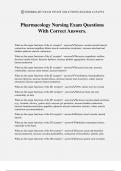©THEBRIGHT EXAM STUDY SOLUTIONS 8/22/2024 12:54 PM
Pharmacology Nursing Exam Questions
With Correct Answers.
What are the major functions of the α1 receptor? - answer✔✔Increase vascular smooth muscle
contraction, increase pupillary dilator muscle contraction (mydriasis), increase intestinal and
bladder sphincter muscle contraction
What are the major functions of the α2 receptor? - answer✔✔Decrease sympathetic outflow,
decrease insulin release, decrease lipolysis, increase platelet aggregation, decrease aqueous
humor production
What are the major functions of the β1 receptor? - answer✔✔Increase heart rate, increase
contractility, increase renin release, increase lipolysis
What are the major functions of the β2 receptor? - answer✔✔Vasodilation, bronchodilation,
increase lipolysis, increase insulin release, decrease uterine tone (tocolysis), ciliary muscle
relaxation, increase aqueous humor production
What are the major functions of the M1 receptor? - answer✔✔CNS, enteric nervous system
What are the major functions of the M2 receptor? - answer✔✔Decrease heart rate and
contractility of atria
What are the major functions of the M3 receptor? - answer✔✔Increase exocrine gland secretions
(e.g., lacrimal, salivary, gastric acid), increase gut peristalsis, increase bladder contraction,
increase bronchoconstriction, pupillary sphincter muscle contraction (miosis), ciliary muscle
contraction (accommodation)
What are the major functions of the D1 receptor? - answer✔✔Relaxes renal vascular smooth
muscle
What are the major functions of the D2 receptor? - answer✔✔Modulates transmitter release,
especially in the brain
What are the major functions of the H1 receptor? - answer✔✔Increase nasal and bronchial
mucus production, increase vascular permeability, contraction of bronchioles, pruritis, pain
What are the major functions of the H2 receptor? - answer✔✔Increase gastric acid secretion
, ©THEBRIGHT EXAM STUDY SOLUTIONS 8/22/2024 12:54 PM
What are the major functions of the V1 receptor? - answer✔✔Increase vascular smooth muscle
contraction
What are the major functions of the V2 receptor? - answer✔✔Increase H2O permeability and
reabsorption in collecting tubules of kidney (V2 is found in the "2" kidneys)
What receptors are associate with Gq? - answer✔✔H1, α1, V1, M1, and M3
What receptors are associated with Gs? - answer✔✔H2, B1, B2, V2, D1
What receptors are associated with Gi? - answer✔✔M2, α2, D2
Bethanechol - answer✔✔-Direct cholinergic agonist
-Activates bowel and bladder smooth muscle
-Used in postoperative and neurogenic ileus
-Resistant to AChE
Carbachol - answer✔✔-Direct cholinergic agonist
-Carbon copy of acetylcholine
-Constricts pupils and relieves intraocular pressure in glaucoma
Methacholine - answer✔✔-Direct cholinergic agonist
-Stimulates muscarinic receptors in airways when inhaled
-Used as a challenge test for diagnosis of asthma
Pilocarpine - answer✔✔-Direct cholinergic agonist
-Contracts ciliary muscle of eye (open angle glaucoma), contracts pupillary sphincter (closed
angle glaucoma)
-Potent stimulator of sweat, tears and saliva
-AChE resistant
Donepezil - answer✔✔-Anticholinesterse - increases ACh
-Alzheimer disease
Galantamine - answer✔✔-Anticholinesterse - increases ACh
-Alzheimer disease
Rivastigmine - answer✔✔-Anticholinesterse - increases ACh
-Alzheimer disease
, ©THEBRIGHT EXAM STUDY SOLUTIONS 8/22/2024 12:54 PM
Edrophonium - answer✔✔-Anticholinesterse - increases ACh
-Historically used to diagnose myasthenia gravis (MG is now diagnosed by anti-AChR Ab test.
Neostigmine - answer✔✔-Anticholinesterse - increases ACh
-Used in postoperative and neurogenic ileus and urinary retention, myasthenia gravis, and
postoperative reversal of neuromuscular junction blockade
Physostigmine - answer✔✔-Anticholinesterse - increases ACh
-Used in anticholinergic toxicity
-Crosses the blood-brain barrier (CNS)
Pyridostigmine - answer✔✔-Anticholinesterse - increases ACh
-Increases muscle strength
-Used in myasthenia gravis (long acting)
-Does not penetrate CNS
Atropine - answer✔✔-Muscarinic antagonist
-Used in bradycardia and for ophthalmic applications
-Also used as antidote for cholinesterase inhibitor poisoning
-Actions include increase pupil dilation, cycloplegia, decreased airway secretions, decreased acid
secretions, decreased gut motility, decreased bladder urgency in cystitis
-Toxicity: increased body temp (due to decreased sweating), rapid pulse, dry mouth, dry and
flushed skin, cycloplegia, constipation, disorientation;
-Can cause acute angle-closure glaucoma in elderly (due to mydriasis), urinary retention in men
with prostatic hyperplasia, and hyperthermia in infants
-See also homatropine and tropicamide
Benztropine - answer✔✔-Muscarinic antagonist
-Works in CNS
-Used in Parkinson disease and acute dystonia
Glycopyrrolate - answer✔✔-Muscarinic antagonist
-Parental use: preoperative use to reduce airway secretions
-Oral use: drooling, peptic ulcer
, ©THEBRIGHT EXAM STUDY SOLUTIONS 8/22/2024 12:54 PM
Hyoscyamine - answer✔✔-Muscarinic antagonist
-Antispasmodics for IBS
Dicyclomide - answer✔✔-Muscarinic antagonist
-Antispasmodics for IBS
Ipratropium - answer✔✔-Muscarinic antagonist
-Used in COPD and asthma
Tiotropium - answer✔✔-Muscarinic antagonist
-Used in COPD and asthma
Oxybutynin - answer✔✔-Muscarinic antagonist
-Reduced bladder spasms and urge urinary incontinence
Solifenacin - answer✔✔-Muscarinic antagonist
-Reduced bladder spasms and urge urinary incontinence
Tolterodine - answer✔✔-Muscarinic antagonist
-Reduced bladder spasms and urge urinary incontinence
Scopalamine - answer✔✔-Muscarinic antagonist
-Motion sickness
Tetrodotoxin - answer✔✔-Poisoning can result from ingestion of poorly prepared puffer fish
(exotic sushi)
-Highly potent toxin that binds fast voltage-gated Na+ channels in cardiac and nerve tissue,
preventing depolarization - blocks action potential without changing resting potential (same
mechanism as Lidocaine)
-Causes nausea, diarrhea, paresthesias, weakness, dizziness, loss of reflexes.
-Treatment is primarily supportive.
Ciguatoxin - answer✔✔-Consumption of reef fish (e.g. barracuda, snapper, eel...)
-Causes ciguatera fish poisoning.
-Opens Na+ channels causing depolarization. Symptoms easily confused with cholinergic
poisoning.
-Temperature-related dysesthesia (e.g., "cold feels hot; hot feels cold") is regarded as a specific
finding of ciguatera.




